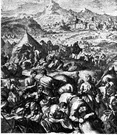dearth
Also found in: Thesaurus, Wikipedia.
dearth
(dûrth)n.
1. A scarce supply; a lack: "the dearth of uncensored, firsthand information about the war" (Richard Zoglin).
2. Shortage of food; famine.
[Middle English derthe, from Old English *dēorthu, costliness, from dēore, costly; see dear1.]
American Heritage® Dictionary of the English Language, Fifth Edition. Copyright © 2016 by Houghton Mifflin Harcourt Publishing Company. Published by Houghton Mifflin Harcourt Publishing Company. All rights reserved.
dearth
(dɜːθ)n
an inadequate amount, esp of food; scarcity
[C13: derthe, from dēr dear]
Collins English Dictionary – Complete and Unabridged, 12th Edition 2014 © HarperCollins Publishers 1991, 1994, 1998, 2000, 2003, 2006, 2007, 2009, 2011, 2014
dearth
(dɜrθ)n.
1. a scarcity or lack.
2. famine.
[1200–50; Middle English derthe]
Random House Kernerman Webster's College Dictionary, © 2010 K Dictionaries Ltd. Copyright 2005, 1997, 1991 by Random House, Inc. All rights reserved.
ThesaurusAntonymsRelated WordsSynonymsLegend:
Switch to new thesaurus
| Noun | 1. |  dearth - an acute insufficiency dearth - an acute insufficiency deficiency, lack, want - the state of needing something that is absent or unavailable; "there is a serious lack of insight into the problem"; "water is the critical deficiency in desert regions"; "for want of a nail the shoe was lost" |
| 2. | dearth - an insufficient quantity or number scarceness, scarcity - a small and inadequate amount |
Based on WordNet 3.0, Farlex clipart collection. © 2003-2012 Princeton University, Farlex Inc.
dearth
noun lack, want, need, absence, poverty, shortage, deficiency, famine, inadequacy, scarcity, paucity, insufficiency, sparsity, scantiness, exiguousness a dearth of resources
Collins Thesaurus of the English Language – Complete and Unabridged 2nd Edition. 2002 © HarperCollins Publishers 1995, 2002
dearth
nounThe American Heritage® Roget's Thesaurus. Copyright © 2013, 2014 by Houghton Mifflin Harcourt Publishing Company. Published by Houghton Mifflin Harcourt Publishing Company. All rights reserved.
Translations
قِلَّه، قَحْط، نَقْص
nedostateknouze
knaphedmangel
nälänhätä
stygiustrūkumas
trukums
Collins Spanish Dictionary - Complete and Unabridged 8th Edition 2005 © William Collins Sons & Co. Ltd. 1971, 1988 © HarperCollins Publishers 1992, 1993, 1996, 1997, 2000, 2003, 2005
Collins English/French Electronic Resource. © HarperCollins Publishers 2005
dearth
n → Mangel m (→ of an +dat); dearth of ideas → Gedankenarmut f; there is no dearth of young men → an jungen Männern ist or herrscht kein Mangel
Collins German Dictionary – Complete and Unabridged 7th Edition 2005. © William Collins Sons & Co. Ltd. 1980 © HarperCollins Publishers 1991, 1997, 1999, 2004, 2005, 2007
Collins Italian Dictionary 1st Edition © HarperCollins Publishers 1995
dearth
(dəːθ) noun a lack of. They suffer from a dearth of resources and of experienced men.
Kernerman English Multilingual Dictionary © 2006-2013 K Dictionaries Ltd.